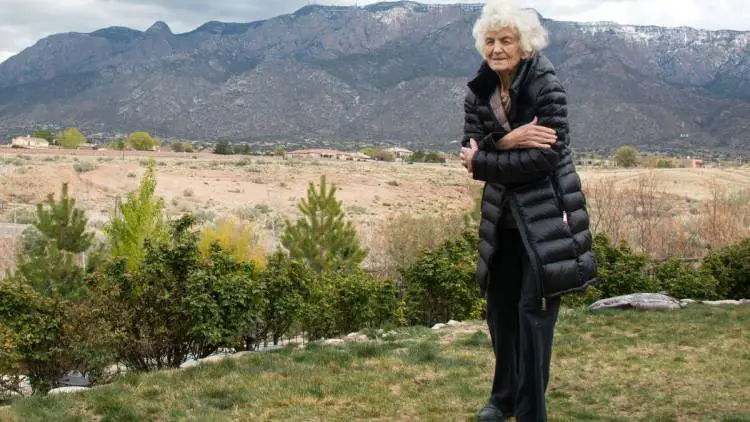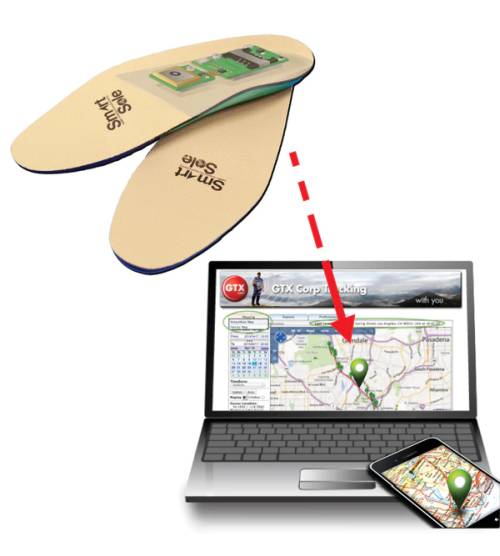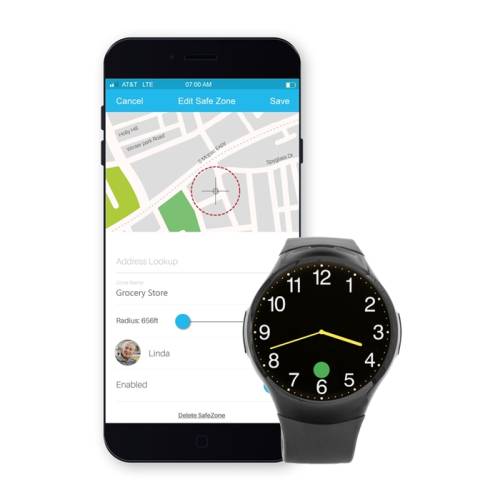Should Tracking Devices Be Part of Dementia Care?
There are some good arguments to be made for using tracking devices for dementia patients. Knowing where they are at all times is critical information that can keep them safe. No one wants a loved one lost and frightened. However, seniors, even those with cognitive problems, have a right to sneak to the bakery for a donut without someone sitting in judgment.
Tracking Device – Yes or No
For a caretaker, this can be a difficult ethical issue. These caretakers, whether family or professional, live with the dread that the senior in their care may get lost and go missing. A wandering elderly person who is lost is at tremendous risk to his or her safety, and this fact alone explains the popularity of monitoring loved ones with tracking devices.
Using a tracking device gives a person with dementia more freedom to do what he or she wants and go where she or he pleases. It’s a means of remaining independent longer, which everyone wants to do, and it increases the senior’s confidence. He or she does not need to be afraid of leaving the home and can even continue to socialize, which is very important. In case of a problem, the caretaker can be on top of the situation quickly.
From the caretaker’s point of view, a tracking device provides peace of mind as it lessens the need to worry.
On the negative side, tracking devices create a loss of privacy. Can an argument be made that concern over a person’s welfare trumps the need for privacy and the limitation of civil liberties for someone who may be a danger to him or herself? Some may view it as dehumanizing. In addition, there is always the chance that a caretaker may slap on a tracking device and consider the job done and provide little additional care to the senior.
These are difficult questions, and the answer may depend on individual circumstances that should be discussed with the senior’s doctor.
Here are issues to be considered:
- Should permission be received from the senior before using a tracking device? The answer is probably yes, and the caretaker should provide a suitable explanation of why the device is needed. A lot depends on how far along the Alzheimer’s is.
- What if the senior agrees, but changes his or her mind later? If the person is in a state of cognitive decline, it is possible he or she cannot remember the reasons for wearing a tracker. This would be the time to gently remind them.
- There comes a time when a senior is unable to care for him or herself physically and/or cognitively, which means asking for permission is somewhat useless. A family member or caretaker needs to get a Power of Attorney granting the caretaker the power to make decisions for the senior and to determine what is in the senior’s best interest.
Types of Tracking Devises for Seniors
There are several types of tracking devices available in the market that can help monitor dementia patients. Some of the top tracking devices for monitoring dementia patients include GPS watches, GPS tracking devices, and wearable sensors. GPS watches are a popular option as they can provide real-time tracking and location information. GPS tracking devices can be attached to clothing or personal items and can also provide real-time location information. Wearable sensors are another option that can detect movement and alert caregivers if the patient wanders beyond a certain area. It’s important to research and compare different tracking devices to find one that best fits the needs of the patient and caregiver. Consider the following when trying to decide which tracking device is best.
- How will be person wear the tracking device. If he or she already suffers from dementia, how will they remember? The best solution is to find a tracking device they have on them no matter what, such as a cell phone, or a pendant they always wear.
- If the senior already has a Medical Alert, it may already have tracking capabilities. If getting a Medical Alert is in the senior’s near future, it can be a good idea to combine both.
- A caretaker should consider whether the senior merely requires tracking or if some kind of alert is needed when the senior moves from a certain area – such as leaving the home. The latter is called geo-fencing and that feature is not available on every tracking device.
- There are watches on the market with built-in tracking capabilities, which is one possible solution if the senior always wears a watch. Some of these watches have a clasp that prevents the senior from taking it off.
There are newer devices in development that can use AI and machine learning to understand typical habits, such as moving from the bedroom to the bathroom, but alert a caregiver when the movements don’t match the normal movement pattern.
How Dementia Patients Get Lost
Wandering and getting lost is one of the most worrisome dementia-associated behaviors. The parent or patient can become lost, hurt, or risk life due to exposure to harsh weather. At some point in time, six out of ten Alzheimer patients become confused enough to wander and get lost. Some of the reasons they wander off are:
- Simple confusion can prevent them from realizing they are in their own backyard, and they begin to wander in search of their home, even though they are already there.
- The person may be having a vivid flashback of having to pick up children from school many years ago and is now wandering in search of the school and the children.
- He or she could be reliving a past threat – such as a mugging – and is scared enough to feel the need to escape.
- Some dementia patients become bored due to lack of stimulation, so they may wander in search of something entertaining.
What Stage of Dementia Does Wandering Begin?
Wandering can begin at any point during dementia, whether the patient is at the early or late stages.
- The very presence of dementia puts that person at risk of wandering, even at the onset of the disease. A caretaker should notice initial signs, which can include continuously returning late from a familiar activity, such as work, shopping, or a regular appointment. It could be a sign of the onset of confusion.
- If a person has sudden difficulty finding a familiar place, such as the market he or she has been going to for years, or a friend’s house that the person has visited many times, it could be the beginning of wandering.
- If a senior with a cognitive disorder talks about needing to complete an activity – such as mowing the lawn when the person moved to an apartment years ago – he or she could be at risk of wandering. Or, a person may insist on having to go to work or pick up the children from school – even though the person is retired, and the children are grown and have moved out.
8 Tracking Devices for Dementia Patients
AngelSense Personal GPS Tracker
- FREE SERVICE FOR 1st MONTH with easy activation | MONTHLY SUBSCRIPTION REQUIRED: 49.99 per month with a 1-year contract & includes SIM card, Unlimited Live Tracking, Assistive Speakerphone with 60 Voice Mins per month, Intelligent Alerts, Premium Safety Features, Unlimited Live US Customer Care, & more | KIT INCLUDES: AngelSense GPS Device with Speakerphone, Soft Protective Sleeve, 3 Non-Removable Fasteners, Parent Key
- PREMIUM ASSISTIVE TECHNOLOGY: Safest solution for autism, special needs & dementia | Offers continuous, all-day, ACCURATE & RELIABLE REAL-TIME TRACKING: Outdoor & Indoor | PROACTIVE ALERTING: Know immediately if your loved one elopes | ASSISTIVE SPEAKERPHONE with AUTO PICKUP: Talk to your child at any time or listen in & make sure they’re ok, Auto-Answer Call: provide them with effective remote support, SOS Call Button | CUSTOMIZABLE: Geofences, Safe Places, Guardians | Detailed Location History
This is a two-way phone to track anyone, including seniors with dementia. It is available through a monthly subscription service, and it enables caretakers to know where a senior is at all times.
The tracker will monitor daily routine and send alerts for variations, such as late arrivals, etc., or if he or she is wandering in a crowd. Either the caretaker or the senior can call immediately if something is wrong. The senior can press a button to request that the caretaker call. The caretaker is “pinged” every time the senior leaves one site to go to another.
Pros:
- Features can be turned off for privacy reasons, if desired.
- The caretaker can listen in on the senior without disturbing him or her.
- The senior’s entire route can be monitored in real-time. It informs the caretaker if the senior took a wrong turn or is lost.
Cons:
- It takes a minute for the caretaker’s phone to ring following a call request.
Seculife SOS Wristband
- Safety Monitor: The SOS Wristband is the perfect solution to keep your loved ones safe. SecuLife's simple to use safety alert wristband provides an innovative way to monitor your loved ones location anytime, from anywhere. Our SOS wristband was designed to be used for people with autism, special needs, parkinsons, alzeihmers & dementia.
- 𝐌𝐎𝐍𝐓𝐇𝐋𝐘 𝐒𝐔𝐁𝐒𝐂𝐑𝐈𝐏𝐓𝐈𝐎𝐍 𝐑𝐄𝐐𝐔𝐈𝐑𝐄𝐃 Just like a cellphone, your tracker needs a paid voice, SMS, and data connection for unlimited distance tracking. An Annual subscription is required for the device's GPS Tracking, mobile app, cellular connectivity, and all premium safety features, plus secured US-based servers. Subscription is $25ye/month with initial prepayment for 3 months on a yearly contract or $15/month with a prepayment of $180 for one year.
This Wristband is designed for dementia patients, with its SOS button, app tracking and two-way calling capability.
The band includes real-life tracking, and seniors can be tracked from a phone, tablet, or laptop. In the event of an emergency, the senior can push the SOS button for an instantaneous alert. There is also a two-way call feature. Physically impaired seniors can use the auto-answer feature.
Pros:
- Emergency contacts can be added if the main caretaker is unavailable.
- The types of alerts desired can be set from email to text.
Cons:
- Permission to track can be turned on and off.
Spot 3 Satellite GPS Messenger
No products found.
The Spot 3 Satellite GPS Messenger allows seniors to send emergency SOS alerts. Its GPS feature makes it easy to find him or her. It is a small device – 2.56 x 1 x 3.43 inches weighing only 0.25 pounds. Simply attach it to a handy item – a knapsack or a purse – then the GPS will track – but the tracking button must be activated.
Pros:
- The senior can messenger his or her location, and the caretaker can track it from the information provided.
Cons:
- It has an $18.33 monthly fee.
- The messages are pre-programmed.
- Specific tracking features cost extra.
- Customer service is flawed.
Smart Sole Tracker
The Smart Sole Tracker is placed within the shoe, then forgotten. It is a great solution for dementia-prone seniors who wander, and it is hidden and discreet. Even advanced dementia patients remember their shoes. It provides an automatic location update via email or text every few minutes.
Pros:
- The sole tracker cannot be forgotten or lost.
Cons:
- There is no emergency button that allows for immediate communication when necessary.
LandAirSea Sync GPS Tracker
- Premium GPS Tracker — The LandAirSea 54 GPS tracker provides accurate global location, real-time alerts, and geofencing. Easily attaches to vehicles, ATVs, golf carts, or other critical assets.
- Track Movements in Real-Time — Track and map (with Google Maps) in real-time on web-based software or our SilverCloud App. Location updates as fast as every 3 seconds with historical playback for up to 1 year.
LandAirSea Sync GPS Tracker does real-life tracking anywhere in the world – so it works great while traveling. It is small enough to fit in a purse.
Pros:
- It will give proximity alerts when needed.
- Excellent customer service.
Cons:
- This tracker requires a subscription.
Theora Care
Theora Care App combines a watch with a phone to keep caretakers and seniors connected. The caregiver can create a safe zone for monitoring and GPS tracking when the senior leaves the safe zone. If the senior wanders, the GPS tracking reveals the location. The caretaker can call the senior directly. Even if the senior is unable to answer, he or she can hear the caretaker’s voice and be reassured.
Pros:
- Contacts other than the caretaker can be added to the App.
- No contract is required.
Cons:
- The App is free, but the Smartphone is not included.
Medical Guardian
- CALL TO ACTIVATE: Please note that activation of the service for our medical alert systems through a phone call is required prior to use. There are absolutely no hidden charges or contracts for our devices. Our service is free to activate. After one month free, you will only be charged a monthly fee starting at $34.95/month.
- WEARABLE MEDICAL ALERT SYSTEMS FOR SENIORS: Being half the size of traditional senior alarm systems makes our elderly monitoring senior alert system and panic button easy and convenient. Use our easy-to-use clip to attach our mini medical alert to clothing, a belt, a bag, or attach it to a lanyard and wear it as a medical personal alarm around the neck
The Medical Guardian in a Medical Alert Call Button with a two-way speaker connected to the Verizon network. In the event of an emergency, the senior can contact an operator. The device is a clip-on, and the senior needs to remember to wear it. When the emergency site has been reached, the operator can either send assistance or contact the listed guardian and caretaker.
Pros:
- Works with the press of a button. The senior doesn’t even need to dial a phone number.
- Lightweight enough to wear around the neck.
Cons:
- Verizon coverage needs to be available.
- The caretaker cannot contact the senior directly.
GPS Tracker – Optimus 2.0
- Accurate, Discreet, Real-Time GPS Tracker with POWERFUL Twin Magnet Case.
- Email and Text Message Alerts for Movement, Speeding, Leaving or Entering Areas, Low Battery, SOS Button - Driving Reports.
This GPS tracker provides both email and text alerts when there is movement or signs of existing and entering certain areas. It does real-time tracking of moving vehicles and reveals the movements of a loved one as they happen and confirms that he or she arrived safely. The tracker attaches to an object, such as a car, with a magnet.
Pros:
- Notifications are received via email, text, or phone.
- Alerts are made via Google maps, showing movement and stops.
Cons:
- There is a monthly subscription fee.
Ways to Prevent Dementia Wandering
Tracking devices are an excellent way to help prevent seniors with dementia from wandering and getting lost. Fortunately, there are a few other measures a caretaker can take to keep someone from roaming.
- Provide structured activities to keep the senior physically and mentally occupied, depending on his or her ability. Arts and crafts projects can be an inspired choice.
- Determine the time of day the senior has been wandering – those are the times when activities should be planned to reduce the senior’s anxiety. Create some structure to the person’s day and review it each morning.
- Busy places are the most disorienting for seniors with dementia. It’s a good idea to avoid bringing them to malls and other such locations.
- Install door alarms in the house that sound an alert when they are opened at nighttime.
- Label interior doors and have signs explaining the internal location – such as an arrow with the word, “kitchen” or “bathroom.” Sometimes, wandering seniors are actually looking for something within the house, not outside.
- To prevent dementia-at-risk seniors from wandering out of the house, keep keys and wallets out of sight.
- Make it part of the routine to take a picture of them every morning. Should he or she become lost, there will be an up-to-date phone of him or her wearing the latest clothes which the police and/or news stations can post.
ABOUT THE AUTHOR

Jon is a writer, clinical author, and expert on topics related to health technology, aging, medical devices, pharmaceuticals, and skincare. He earned a Graduate Certificate in Pharmaceutical Chemistry from the University of Florida College of Pharmacy along with post graduate studies at the University of Colorado Healthcare Administration program.










